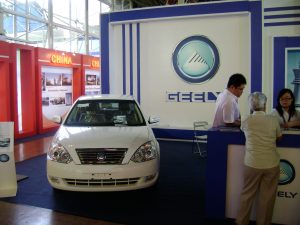CUBA STANDARD — As the Cuban government is gradually freeing new-car sales for individuals, Chinese automaker Geely, already the No. 1 auto seller on the island, is positioning itself for growth in Cuba and the wider region.
The company is planning to establish a semi-knock down (SKD) assembly plant in Cuba, Shanghai Geely International Corporation, Geely’s international arm, announced in a press release republished by Global Times. The company didn’t provide any specifics.
In an ambitious global expansion plan, Geely set a target of opening 15 assembly plants overseas by 2015, according to an article by Automotive Logistics magazine.
In semi-knock down assembly, a manufacturer typically exports a kit with complete car body, usually coated or already painted, to then add engine and transmission, tires, wheels, seats, headlights, glass, batteries, interior plastics, or other components in final assembly, some of them locally sourced.
“At the request of several ministries in Cuba, including the Ministry of Foreign Trade and Investment, the Ministry of Communications, and the Ministry of Metallurgy Industry, Geely International is now preparing to launch the SKD project in a local place,” the company said in the press release.
The announcement comes as the Cuban government is seeking manufacturers to open shop at its new Mariel Special Development Zone, an export-oriented zone around a deepwater port 30 miles west of Havana.
Cuba is the company’s largest market in the Caribbean, Central America and northern part of South America. Geely sold at least 3,200 vehicles to Cuba in 2013, in two batches; the Geely CK has held the spot of most-sold new car model in Cuba since 2009. The company is also selling vehicles in Costa Rica, Colombia and Venezuela.
In 2012, the company opened a contract assembly plant in Uruguay in a joint venture with a local partner, making it Geely’s first in the Western hemisphere. The plant, with a capacity of 20,000 cars per year, is supplying primarily Mercosur markets Brazil, Argentina and Uruguay, as well as Chile. Forty percent of the components in Uruguay are locally sourced, with a goal of reaching 60 percent by the third year.
All Geely vehicles sold to Cuba in 2013 were made at the Uruguayan plant.
On Dec. 19, official media announced that for the first time since 1959, individuals will be allowed to purchase new cars without a permit. The state will retain its monopoly over new-car sales.
“Geely International actively takes measures in relevant areas and has achieved essential progress,” the company said in a recent statement about the Cuban market.
“Geely is continuously improving the storage structure of its bonded warehouse and is adopting multi-channel supply methods” for spare parts, the company said. Geely’s warehouse in Cuba now is at 80 percent of capacity, up from 34 percent last year. The company has also signed agreements with SASA, a local auto service provider operated by the Committees for the Defense of the Revolution, to jointly open standard service stations and spare-part sales stores.
Nearly 10,000 Geely-brand cars and trucks are already circulating on Cuban roads, the company said. Government agencies, such as the Committees for the Defense of the Revolution, the Ministry of the Interior, and the Ministry of Tourism, have been the only buyers of new cars until now. Geely’s CK models are used as senior government officials’ cars; most police cars in Havana are Geely CK models as well. At present, 80 percent of rental cars in Cuba are Geely CK, EC7 and EC8 models; all rental agencies are state-owned.

